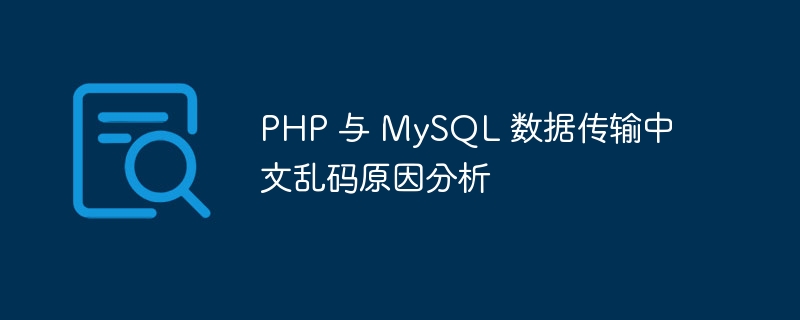Home >Backend Development >PHP Tutorial >Analysis of the causes of Chinese garbled data transmission between PHP and MySQL
Analysis of the causes of Chinese garbled data transmission between PHP and MySQL
- WBOYWBOYWBOYWBOYWBOYWBOYWBOYWBOYWBOYWBOYWBOYWBOYWBOriginal
- 2024-03-06 15:18:051178browse

Analysis of the causes of Chinese garbled data transmission between PHP and MySQL
With the development of the Internet, PHP and MySQL have become one of the most commonly used technologies in website development. During the development process, Chinese garbled characters are often encountered, especially during the data transmission process between PHP and MySQL. This article will analyze the causes of Chinese garbled data transmission between PHP and MySQL, and provide specific code examples to solve this problem.
Problem Background
In actual development, we often interact with MySQL database in PHP scripts, which may involve the storage and reading of Chinese characters. However, due to the different character sets used by PHP and MySQL and the encoding problems that may exist in different environments, Chinese garbled characters often occur.
Cause analysis
- Character set mismatch:
The default character sets used by PHP and MySQL may be inconsistent, such as PHP The default is UTF-8, while MySQL uses Latin1 by default. If the character set is not specified when PHP inserts data into MySQL, garbled characters may occur.
- Connection character set setting error:
When connecting to the MySQL database, failure to set the correct character set may cause errors during data transmission. Garbled characters. For example, if the character set is not specified as UTF-8 when connecting to the database, Chinese characters may be garbled.
- Data storage issues:
During the data storage process, if the character set encoding of the field is not set correctly, or data with different encodings are mixed Sometimes, it will also cause Chinese garbled characters.
Solution
In order to solve the problem of Chinese garbled data transmission between PHP and MySQL, some specific solutions and code examples are provided below:
1. Set PHP file encoding
Add the following code at the beginning of the PHP file to ensure that the PHP script uses UTF-8 encoding to process Chinese characters:
header('Content-Type: text/html; charset=UTF-8');
mb_internal_encoding('UTF-8');2. Set the MySQL connection character set
When connecting to the MySQL database , set the character set to UTF-8 for the current connection to ensure that no garbled characters will appear during data transmission:
$mysqli = new mysqli('localhost', 'username', 'password', 'database');
$mysqli->set_charset('utf8');3. Data storage setting character set
When creating the database table, ensure The character set of the field is UTF-8. The sample SQL statement is as follows:
CREATE TABLE `users` ( `id` int(11) NOT NULL, `name` varchar(50) CHARACTER SET utf8 COLLATE utf8_unicode_ci NOT NULL, PRIMARY KEY (`id`) ) ENGINE=InnoDB DEFAULT CHARSET=utf8;
4. Data reading processing
When reading data from the database, use PHP's mb_convert_encoding The function converts data to UTF-8 format. The sample code is as follows:
$result = $mysqli->query("SELECT name FROM users");
while ($row = $result->fetch_assoc()) {
$name = mb_convert_encoding($row['name'], 'UTF-8', 'Auto');
echo $name;
}Conclusion
Through the above specific solutions and code examples, I hope it can help readers transfer data between PHP and MySQL. Avoid Chinese garbled characters in the process. In actual development, it is crucial to correctly set the character set, connection character set, data storage and reading processing. Only by ensuring that all links use unified character set encoding can the problem of Chinese garbled characters be effectively avoided. I hope this article is helpful to you, thank you for reading!
The above is the detailed content of Analysis of the causes of Chinese garbled data transmission between PHP and MySQL. For more information, please follow other related articles on the PHP Chinese website!

